本试题 “单句改错下面每句中都有一处错误。错误涉及一个单词的增加、删除或修改。增加:在缺词处加一个漏字符号(∧),并在其下面写出该加的词。删除:把多余的词用斜线...” 主要考查您对连接代词
关系代词
形容词的比较级
介词和介词短语
系动词
动词短语
主谓一致
等考点的理解。关于这些考点您可以点击下面的选项卡查看详细档案。
- 连接代词
- 关系代词
- 形容词的比较级
- 介词和介词短语
- 系动词
- 动词短语
- 主谓一致
连接代词的概念:
连接代词常用来引导一个主语从句、宾语从句和表语从句,在句中可用作主语、宾语、表语、定语等,连接代词主要包括who, whom, what, which, whose, whoever, whatever, whichever, whosever等。
whatever, whoever, whichever 用法说明:
主要用于引导主语从句和宾语从句。
如:He does whatever she asks him to do. 她要他做什么,他就做什么。
Whoever breaks the rules will be punished.谁违反这些规则都将受到处罚。
I'll give the ticket to whoever want sit. 请想要这票,我就把它给谁。
Whichever team gains the most points wins. 哪个队得分最多,哪个队就赢。
注:其中的ever主要用于加强语气,含有“一切”、“任何”、“无论”之义。使用这类词时,注意不要按汉语习惯用错句子结构:
如:任何人(谁)先来都可以得到一张票。
误:Anyone comes first can get a ticket./ Who comes first can get a ticket.
正:Anyone who comes first can get a ticket./ Whoever comes first can get a ticket.
连接代词的用法:
1、连接代词主要包括who, whom, what, which, whose, whoever, whatever, whichever, whosever等,它们在句中可用作主语、宾语、表语、定语等,可以引导主语从句、宾语从句和表语从句:
如:I don't know who he is. 我不知道他是谁。
What he says sounds reasonable. 他说的话听起来很有道理。
The question is who(m) we should trust. 问题是我们该信任谁。
I'll take whoever wants to go. 谁想去我就带谁去。
Take whichever seat you like? 你喜欢坐哪个座位就坐哪个?
I will just say whatever comes into my mind. 我想到什么就说什么。
注:who, whom, whoever等不用于名词前作定语。
2、what的两种用法。请看以下两个句子:
(1)I didn't know what he wanted. 我不知道他想要什么。
(2)I gave her what she wanted. 我给了她想要的一切。
上面第一句中的what表示“什么”,带有疑问的意味;第二句中的what表示“所…的一切事或东西”,其意义上大致相当于that(those) which, the thing(things) that, anything that, all that, as much as等,又如:
What[=That which] you say is quite true. 你说的完全是事实。
He saves what[=all that] he earns. 他赚多少,积蓄多少。
Call it what[=anything that] you please. 你喜欢叫它什么就叫它什么。
这样用的what有时还可后接一个名词:
如:He gave me what money[=all the money that] he had about him. 他把身边带有的钱全给了我。
What friends[=All the friends that] he has are out of the country. 他所有的朋友都在国外。
连接代词知识体系:

whatever, whoever, whichever 用法说明:
主要用于引导主语从句和宾语从句。
如:He does whatever she asks him to do. 她要他做什么,他就做什么。
Whoever breaks the rules will be punished.谁违反这些规则都将受到处罚。
I'll give the ticket to whoever want sit. 请想要这票,我就把它给谁。
Whichever team gains the most points wins. 哪个队得分最多,哪个队就赢。
注:其中的ever主要用于加强语气,含有“一切”、“任何”、“无论”之义。使用这类词时,注意不要按汉语习惯用错句子结构:
如:任何人(谁)先来都可以得到一张票。
误:Anyone comes first can get a ticket./ Who comes first can get a ticket.
正:Anyone who comes first can get a ticket./ Whoever comes first can get a ticket.
关系代词的概念:
英语中的关系代词有who, whom, whose, that, which, 它们是用来引导定语从句的。关系代词既代表定语从句所修饰的词,又在其所引导的从句中承担一个成分,如主语、宾语、表语、或定语。
如:This is the man who saved your son. (who在从句中作主语,先行词是man)
The man whom I met yesterday is Jim.
A child whose parents are dead is an orphan.
He wants a room whose window looks out over the sea.
关系代词用法:
1、that与which的用法区别:
两者都可指物,常可互换。其区别主要在于:
(1)引导非限制性定语从句时,通常要用which:
如:She received an invitation from her boss, which came as a surprise. 她收到了老板的邀请,这是她意想不到的。
(2)直接放在介词后作宾语时,通常要用which:
如:The tool with which he is working is called a hammer. 他干活用的那个工具叫做锤子。
(3)当先行词是下列不定代词或被它们修饰时much, little, none, all, few, every(thing), any(thing), no(thing)等时,通常用that:
如:There was little that the enemy could do but surrender. 敌人无法,只有投降了。
All[Everything] that can be done must be done. 凡能做的事都必须做。
(4)当先行词有the very, the only, the same等修饰时,通常用that:
如:This is the only example that I know. 我知道的例子只有这一个。
Those are the very words that he used. 那是他的原话。
(5)当先行词有形容词最高级或序数词(包括last, next等)等修饰时,通常用that:
如:This is the best dictionary that I've ever used. 这是我用过的最好的词典。
The first thing that you should do is to work out a plan. 你应该做的第一件事是订个计划。
(6)当关系代词在定语从句中用作表语时,通常用that:
如:China is not the country(that) it was. 中国已不是过去的中国了。
(7)当先行词是一个既指人又指物的并列词组时,通常用that:
如:They talked about the persons and things that most impressed them. 他们谈论了使他们印象最深的人和事。
(8)当要避免重复时:
如:Which is the course that we are to take? 我们选哪门课程?
2、that与who的用法区别:
(1)两者均可指人,有时可互换:
如:All that[who] heard him were delighted. 所有听了他讲话的人都很高兴。
Have you met anybody that[who] has been to Paris? 你遇见过到过巴黎的人吗?
He is the only one among us that[who] knows Russian. 他是我们中间唯一懂俄语的人。
(2)但是在下列情况,通常要用that:
①当先行词是一个既指人又指物的并列词组时:
如:I made a speech on the men and things that I had seen abroad. 我就我在国外所见到的人和事作了报告。
②当先行词是who时(为避免重复):
如:Who was it that won the World Cup in1982? 谁赢得了1982年的世界杯?
③当关系代词在定语从句中作表语时(可省略):
如:Tom is not the boy(that) he was. 汤姆这孩子已不是以前那个样子了。
关系代词知识体系:
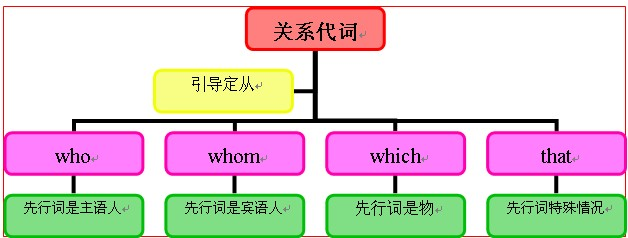
关系代词用法拓展:
1、as与which的用法区别:
(1)引导限制性定语从句时,在such,as,thesame后只能用as,其他情况用which:
如:I never heard such stories as he tells. 我从未听过他讲那样的故事。
It's the same story as I heard yesterday. 这故事跟我昨天听到的一样。
This is the photo which shows my house. 这张照片拍的是我的住宅。
(2)引导非限制性定语从句时,有时两者可互换:
如:I live a long way from work, as [which] you know. 我住得离工作单位很远,这你是知道的。
(3)但在,在以下情况引导非限制性定语从句时,两者不可换用:
①当从句位于主句前面时,只用as:
如:As is known to everybody, the moon travels round the earth once every month. 月球每月绕地球转一周,这是每个人都清楚的。
②as引导的非限制性定语从句应与主句在意义上和谐一致,which无此限制:
如:He went abroad, as[which] was expected. 他出国了,这是大家预料到的。
He went abroad, which was unexpected. 他出国了,这让大家感到很意外。(不用as)
③as引导非限制性定语从句时,先行词通常不能是主句中某个具体的词,而应是整个句子、整个短语或某个短语推断出来的概念,而which则无此限制:
如:The river, which flows through London, is called the Thames. 这条流经伦敦的河叫泰晤士河。(不用as)
④当as引导非限制性定语从句作主语时,其谓语通常应是连系动词,而不宜是其他动词,而which则无此限制:
如:She has married again, as[which] seemed natural. 她又结婚了,这似乎很自常。
She has married again, which delighted us.她又结婚了,这使我们很高兴。(不用as)
2、who与whom的用法区别:
两者均只用于人,从理论上说,who为主格,whom为宾格:
如:Where's the girl who sells the tickets? 卖票的女孩在哪里?
The author whom you criticized in your view has written a letter in reply. 你在评论中批评的那个作者已写了一封回信。
但实际上,除非在正式文体中,宾格关系代词whom往往省略不用,或用who或that代之:
如:The man(that, who, whom) you met just now is called Jim. 你刚遇见的那个人叫吉姆。
不过,在以下几种情况值得注意:
(1)直接跟在介词后面作宾语时,只能用whom,而且不能省略:
如:She brought with her three friends, none of whom I had ever met before. 她带了3个朋友来,我以前都没见过。
(2)引导非限制性定语从句且作宾语时,who和whom均可用,但以用whom为佳,此时也不能省略:
如:This is Jack, who[whom] you haven't met before. 这是杰克,你以前没见过。
形容词比较级概念:
大多数形容词(性质形容词)有比较级,用来表示两个人或事物之间的比较“较……”。
如:I am taller than you.
形容词比较级特殊用法:
1、没有比较对象的比较结构:
所谓没有比较对象的比较结构不是指省略而言,而是指并非真正的比较。
例如:The car runs faster than110 miles. 那辆车时速为110多英里。
There is more than one solution to the problem. 这个问题的解决办法不止一个。
The daily cost in an average hospital in the United States can run as high as $250. 在美国普通医院的每天的费用可高达250美元。
2、用比较级的形式表达最高级的意思:
在这种情况下,往往是将一个人或是一件事与其他所有的人或事相比较。注意别忘了常在比较状语中用any, other, else类的字眼,以将比较主体排除在比较对象以外,因为自己不可以与自己相比较。
例如:He is taller than any one else in our class. 他在我们班比其他任何都高。
Iron is more useful than any other metals. 铁比其他任何金属更有作用。
3、no+比较级+than的结构表示“A和B一样不……”:
例如:She runs no faster than her sister.她与她妹妹一样跑不快。
Tom is no wiser than John. 汤姆和约翰一样没有聪明才智。
He is no richer than his brother. 他与他弟弟一样不富有。
4、汉语可以说“昆明的气候比兰州好”。英语必须加that:
例如:The climate of Kunming is better than that of Lanzhou.
5、英语比较级常译作“较…”、“…一些”等,但不等于汉语的“更…”。汉语的“更…”须用“still”或“even”来表示:
如:This book is even more difficult than that one. 这本书比那本书更难。
6、有些情况下,汉语不用“较”等字眼,英语则须用比较级:
如:Will the younger people give their seats to old people? 请年轻人把座位让给老年人好不好?
形容词比较级的用法:
1、比较级用于二者的比较,其结构是:含有形容词比较级的主句+从属连词than引导的从句(从句中常省去意义上和主句相同的部分)。
如:Li is older than Zhou. 李比周年纪大。(从句中省去了is old)
There are more children in this nursey than in that one. 这个托儿所的孩子比那个托儿所多。(从句中省去了there are children)
After two years' physical training, she is healthier and stronger. 经过两年的体力锻炼,她(比以前)健康强壮多了。(注意这里省去了从句than she was)
We are much better off than ever before. 我们的生活比过去任何时候都要好得多。(than后省去了we were)
Paul weighs less than harry. 保尔的体重比哈利轻。
Mary is less clever than Jane. 玛丽不如简那么聪明。
2、可修饰比较级的词:
1)a bit, a little, rather, much, far, by far, many, a lot, lots, a great deal, any, still, even等
2)还可以用表示倍数的词或度量名词作修饰语。
3)以上词(除by far)外,必须置于比较级形容词或副词的前面。
典型例题:
1)—Are you feeling ____?
—Yes,I'm fine now.
A. any well
B. any better
C. quite good
D. quite better
答案:B. any可修饰比较级,quite修饰原级,well的比较级为better.
2)The experiment was____easier than we had expected.
A. more
B. muchmore
C. much
D. moremuch
答案:C. much可修饰比较级,因此B,C都说得通,但easier本身已是比较级,不需more,因此C为正确答案。
3)If there were no examinations, we should have___at school.
A. the happiest time
B. a more happier time
C. much happiest time
D. a much happier time
答案:D.
注:many, old和far用法:
1)如果后接名词时,much more+不可数名词 many more+可数名词复数
2)old有两种比较级和最高级形式:older/oldest和elder/eldest。elder,eldest只用于兄弟姐妹的长幼关系。
如:My elder brother is an engineer.
3)far有两种比较级,farther,further在英语中两者都可指距离。在美语中,father表示距离,further表示进一步。
如:I have nothing further to say.
3、比较级中的两个特殊作用的结构:
1)The+比较级+句子,表示的意义是“越(怎么样就)越(怎么样)”,在这个结构中的两个“比较级”不要求一定词性相同,它们各自的词性要依句子的需要而定;
2)和比较级+and+比较级。表示的意义是“越来越(怎么样)”,在这个结构中的两个“比较级”则要求词性相同。
例如:The harder you work at your study, the better academicrecords you will have. 你学习越努力,你的成绩就越好。
The more we have, the more we want. 人欲无穷。
When winter is coming, it gets colder and colder. 冬天来临之际,天越来越冷了。
He became less and less satisfied with the foot ball team's performance. 他对足球队的表现越来越不满意了。
形容词比较等级知识体系:
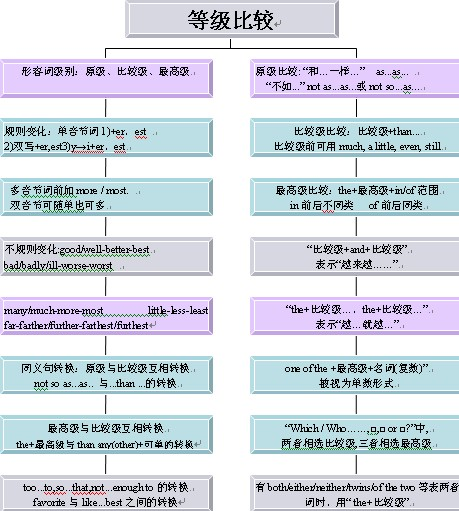
特殊形容词比较级变化:
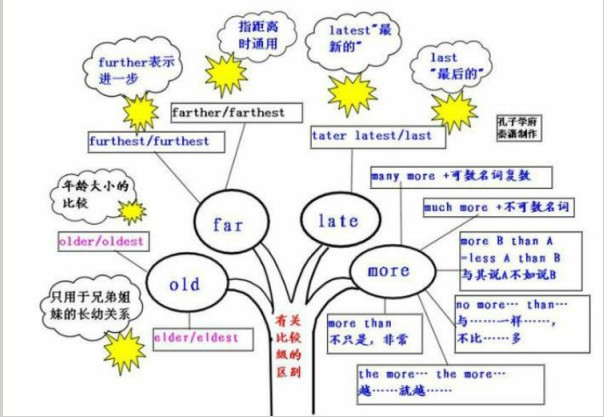
介词和介词短语的概念:
介词是一种用来表示词与词、词与句之间的关系的虚词,在句中不能单独作句子成分。介词后面一般有名词、代词或相当于名词的其他词类,短语或从句作它的宾语。介词和它的宾语构成介词词组,在句中作状语,表语,补语或介词宾语。介词可以分为时间介词、地点介词、方式介词和其他介词。
误用介词的三种情况:
1、多用介词:
多用介词可能是受汉语意思的影响将及物动词误用作不及物动词,也可能是受相关结构的影响而用错:
误:We discussed about the plan.
正:We discussed the plan. 我们讨论了计划。
误:Did he mention about the accident?
正:Did he mention the accident? 他提到那次事故了吗?
误:I saw her enter into the bank.
正:I saw her enter the bank. 我看见她进了银行。
误:He married with[to] a nurse.
正:He married a nurse. 他同一位护士结了婚。
误:How can contact with you?
正:How can contact you? 我怎么与你联系?
误:We should serve for the people heart and soul.
正:We should serve the people heart and soul. 我们应该全心全意地为人民服务。
误:Who controls over the factory? (但名词control可接over)
正:Who controls the factory? 谁管理这个工厂?
误:He has a great many of friends here. (比较a great number of)
正:He has a great many friends here. 他在这儿有很多朋友。
2、漏用介词:
漏用介词可能是受汉语意思的影响将不及物动词误用作及物动词,或是受相关结构的影响的影响而用错等:
误:This matter is difficult to deal. (deal with=处理)
正:This matter is difficult to deal with. 这事很难处理。
误:He is not a man to be depended.
正:He is not a man to be depended on. 他不是个可靠的人。
误:He took a cup of tea, and went on the story.
正:He took a cup of tea, and wentonwiththestory.他喝了一口茶,又接着讲故事。
误:My mother still regards me a child. (比较consider…as中的as可省略)
正:My mother still regards me as a child. 我母亲还把我当小孩看。
误:They insisted sending a car over to fetch us.
正:They insisted on sending a car over to fetch us.他们坚持要派车来接我们。
误:What he says is worth listening.
正:What he said is worth listening to.他的话值得一听。
3、错用介词:
错用介词的情况比较复杂,可能是因受汉语意思的而错,也可能是因弄不清搭配关系而错,可能是混淆用法而错,也可能是受相关结构的影响而错,可能是忽略语境而错,也可能是想当然的用错:
误:She called on his office yesterday. (call on+人,call at+地点)
正:She called at his office yesterday. 她昨天去了他办公室拜访。
误:He is engaged with a nurse.
正:He is engaged to a nurse.他与一位护士订了婚。
误:The sun rises from the east.
正:The sun rises in the east.太阳从东方升起。
误:Under his help, I finished it in time.
正:With his help, I finished it in time. 在他的帮助下,我及时做完了。
误:During he was in Japan, he visited many places.
正:During his stay in Japan, he visited many places.他在日本期间,参观过许多地方。
误:We are familiar to his character.
正:We are familiar with his character.我们了解他的性格。
误:Help yourself with the fruit.
正:Help yourself to the fruit.吃点水果吧。
介词的宾语:
1、名词或代词作介词宾语:
如:Are you interested in history? 你对历史感兴趣吗?
Don't worry about it. 别为它担心。
注:若是人称代词用作介词宾语,要注意用宾格。
如:No one can sing like her. 没有人能像她那样唱歌。(不能用like she)
2、动名词作介词宾语:
如:He is good at telling stories. 他善于讲故事。
In crossing the street he was run over. 他在穿过马路时被汽车撞倒。
3、过去分词作介词宾语:
如:We can't regard the matter as settled. 我们不能认为这事已经解决。
I take it for granted you have read the book. 我以为你读过这本书。
注:过去分词用作介词宾语通常只见于某些固定结构中,如上面第1句涉及regard…as(认为…是)结构,第2句涉及take sth for granted(认为某事属实)。在其他情况下,介词后通常不直接跟过去分词作宾语,若语义上需要接过去分词(表被动),可换用“being+过去分词”:
如:He went out without being seen by the others.他出去了,没有被其他人看见。
4、从句作介词宾语:
如:He was not satisfied with what she said. 他对她说的不满意。
I'm worried about where he is. 我担心他上哪儿去了。
注:介词后通常不接that从句,遇此情况需考虑用其他结构:
误:He paid no attention to that she was poor.
正:He paid no attention to the fact that she was poor. 他根本不注意她很穷这一事实。
但有个别介词(如except)可接that从句。
比较:I know nothing about him except that he lives next door./I know nothing about him except for the fact that he lives next door. 我只知道他住在隔壁,其它的就不知道了。
5、不定式作介词宾语:
如:I had no choice but to wait. 除了等,我没有别的选择。
He wanted nothing but to stay there. 他只想留在那儿。
They did nothing but complain. 他们老是一个劲地抱怨。
He never did anything but watch TV. 除了看电视,他从不干任何事。
注:(1)介词后接不定式的情形通常只见于but, except等极个别个词。该不定式有时带to,有时不带to,其区别是:若其前出现了动词do,其后的不定式通常不带to;
若其前没有出现动词do,则其后的不定式通常带to。
(2)介词后虽然通常不直接跟不定式作宾语,但却可接“连接代词(副词)+不定式”结构:
如:He gave me some advice on how to do it. 对于如何做这事他给我提了些建议。
6、形容词作介词宾语:
如:Her pronunciation is far from perfect. 她的语音远不是完美的。
In short, we must be prepared. 总而言之,我们要有准备。
Things have gone from bad to worse. 事情越来越糟。
注:(1)有些形容词用作介词宾语可视为其前省略了动名词being:
如:He regarded the situationas(being) serious. 他认为形势严重。
His work is far from(being) satisfactory. 他的工作丝毫不令人满意。
(2)有些“介词+形容词”的结构已构成固定搭配:in full全部地,全面地,无省略地; in private私下地,秘密地; in particular特别地;in general一般地,通常地,概括地; in brief 简言之;in short总之,简言之; in vain徒然地,徒劳无益地;for fee免费地,无偿地; for certain肯定地,确切地;for sure肯定地,确切地; for short为了简短,简称;atl arge自由自在地,逍遥法外; by far…得多
7、副词作介词宾语:
如:I can't stay for long. 我不能久呆。
It's too hot in here. 这里面太热了。
I looked every where except there. 除了那儿,我到处都看过了。
8、数词作介词宾语:
如:The city has a population of four million. 这座城市有四百万人口。
He was among the first to arrive. 他是第一批到的。
9、介词短语作介词宾语:
如:Choose a book from among these. 从这些书中选一本吧。
I saw her from across the street. 我从街的对面望见了她。
注:通常可后接介词短语作宾语的介词是from, till, until, since, except, instead of等。
比较:I took it from the bed. 我从床那儿(或床上)拿的。
I took it from under the bed. 我从床下拿的。
10、复合结构用作介词宾语:
如:She had no objection to Mary marrying him. 她不反对玛丽与他结婚。
She came in with a book in her hand. 她手里拿着一本书走了进来。
All the afternoon he worked with the door locked. 整个下午他都锁着门在房里工作。
介词短语的句法功能:
1、表语:
如:He was with a friend. 他和一个朋友在一起。
Health is above wealth. 健康胜过财富。
This knife is for cutting bread. 这把小刀是用于切面包的。
注:有些介词(如because of)引出的短语通常只用作状语,不用作表语:
误:His absence is because of the rain.
正:His absence is due to the rain. 他因雨未来。
但是,若主语是代词(不是名词),becauseof引出的短语可用作表语:
如:It is because of hard work. 那是因为辛苦工作的原因。
2、状语:
如:Don't touch it with your hands. 别用手去摸它。
Did you do this by design or by accident? 你这样做是有意的还是无意的?
3、定语:
如:This is his reply to your letter. 这是他给你的回信。
This is the best way of doing it. 这是做此事最好的方法。
My love for you is deeper than the sea. 我对你的爱比海深。
4、宾语补足语:
如:I found everythingin good condition. 我发现一切正常。
Her illness kept her in bed for a week. 她因生病在床上躺了一星期。
注:用作宾语补足语的介词短语在相应的被动语态中则为主语补足语:
如:He was regarded as a hero. 他被看成是英雄。
5、宾语:
如:A man stepped out from behind the wall. 一个人从墙后走出来。
He cannot spare anytime except on Sunday. 除星期日外,他抽不出时间。
6、主语:
如:Between6 and 7 suits me. 六点到七点对我比较适合。
After the exams is the time to relax. 考试后是轻松一下的时间。
注:介词短语通常不用作主语,尽管有时也像上面这样用作主语,但通常可视为是在一定的上下文中有所省略:
如:—When are we going to have the next meeting? 我们下次什么时候见面?
—On Tuesday may be convenient. 星期二可能比较方便。
此句中onTuesday虽用作主语,但可视为是其前省略了meeting一词:
即:Meeting during the vacation may be convenient.
系动词的概念:
连系动词(link verb)是一个表示谓语关系的动词。它必须后接表语(通常为名词或形容词)。连系动词的功能主要是把表语(名词、形容词、某些副词、非谓词、介词短语、从句)和它的主语联系在一起,说明主语的属性、特征或状态。它有自己的但不完全的词义,不能在句中独立作谓语,必须和后面的表语一起构成句子的谓语。它是虚词。
系动词的分类:
1、状态系动词:
用来表示主语状态,只有be一词。
例如:He is a teacher. 他是一名教师。(is与补足语一起说明主语的身份。)
2、持续系动词用来表示主语继续或保持一种状况或态度,主要有keep, rest, remain, stay, lie, stand:
例如:The weather will continue cold and wet.
He remained poor after 20years.
The shop will stay open at 11:00p.m.
He stood/sat silent there.
3、表像系动词:
用来表示"看起来像"这一概念,主要有seem, appear, look。
例如:She appears to have know this thing.
She seems a student.
4、感官系动词:
感官系动词主要有feel, smell, sound, taste。
例如:The silk feels soft.
Your idea sounds a good one.
He looked like his mother.
The mixture tasted terrible.
The flower smells sweet.
5、变化系动词:
这些系动词表示主语变成什么样,变化系动词主要有become, grow, turn, fall, get, go, come, run。
例如:My dream o fcoming to China has come true.
In summer food often goes bad.
He turned doctor./ He became a doctor.
He fell asleep as soon as he went to bed.
6、终止系动词表示主语已终止动作,主要有prove, turn out,表达"证实","变成"之意。
例如:The truth he stuck to proved true.
系动词基本用法:
连系动词是表示不完全谓语关系的动词,它与其后的表语一起构成谓语。
常见的连系动词有be(是),become(成为),get(变成),remain(还是),seem(似乎是),look(看上去),feel(感觉)等。
连系动词后的表语通常是名词和形容词,有时也可以是代词、数词、副词、介词短语、不定式、动名词、从句等:
如:His English is excellent. 他的英语很棒。(跟形容词)
He is a famous poet. 他是著名诗人。(跟名词)
Money isn't everything. 金钱不是一切。(跟代词)
She was the first to arrive. 她是第一个到达的人。(跟数词)
Who is up stairs? 谁在楼上?(跟副词)
He is with his friends. 他和朋友在一起。(跟介词短语)
He seems to be ill.他似乎病了。(跟不定式)
Seeing is believing. 眼见为实。(跟动名词)
This is what you need. 这就是你需要的。(跟从句)
注:有些系动词又是实义动词,该动词表达实义时,有词义,可单独作谓语。
例如:1、She tasted①the soup to see if it tasted②too salty. 她尝了一口汤,看是否太咸。
2、The doctor is feeling①his pulse because he feels②sick. 因为身体不舒服,医生正在给他切脉。
3、The mother looked①at the sick child sadly and she looked②sad. 母亲难过地看着生病的孩子。
4、She smelled①the meat to make sure it still smelled②good. 她闻了闻肉,看看是否还新鲜。
5、The teacher asked the students to keep②quite when they were keeping①everything in order. 当学生整理东西时,老师让他们保持安静。
从以例子不难出,标①的动词为实义动词,他们后跟有宾语;标②的动词为系动词,其后往往跟形容词、名词、不定式等作表语。
系动词知识体系:

连系动词使用应注意的两点:
1、关于连系动词后接副词作表语:
连系动词后通常可接形容词作表语,一般不接副词:
误:His English is very well. 他的英语很好。(应将well改为good)
误:Be carefully. 小心点。(应将carefully改为careful)
误:The soup tastes nicely. 这汤味道不错。(应将nicely改为nice)
但是,有时连系动词后也可接副词作表语,不过这主要限于in, on, off, out, away, behind, up, down, over, through, around, round, below, inside, outside等少数副词小品词以及here, there, upstairs, downstairs等少数表示地点或方位的副词:
如:Mother wasn't in last night. 母亲昨晚不在家。
The meeting was over at five. 会议五点结束。
Come along. The taxi is outside. 来吧,出租车在外面。
Mother is downstairs waiting for you. 母亲在楼下等你。
2、关于连系动词后接不定式:
(1)连系动词be后根据情况可自由地接不定式作表语:
如:My dream is to be a scientist. 我的梦想是当一名科学家。
All I could do was to wait. 我只能等。
My plan was to go from London to Paris. 我计划从伦敦去巴黎。
I was to have seen Mr Kay. 我本要去见凯先生的。
(2)seem, appear, prove, continue, turn out, get, grow, come等连系动词后也可接不定式(尤其是to be)作表语:
如:She always seems to be sad. 她常常显得很忧伤。
My advice proved to be wrong. 我的意见证明是错的。
She appears to have many friends. 他好像有很多朋友。
The weather turned out to be fine. 天气结果很好。
Circumstances continue to be favorable. 情况仍然是有利的。
He has grown to like studying English. 他渐渐喜欢学英语了。
【注】
若所接不定式为to be,通常可以省略。不过,若其后接的是表语形容词,则to be通常不宜省略。
另外,连系动词look后能否接tobe似乎尚有争论,不过,在现代英语中接to be的现象已较普遍。
(3)sound, smell, feel, taste, become等连系动词后通常不能接不定式:
误:These oranges taste to be good. (应去掉to be)
误:The roses smell to be nice.(应去掉to be)
(4)有的连系动词后接的从句可用不定式来改写:
如:It seems that she's right./ She seems to be right. 她似乎是对的。
It appears that you have made a mistake./You appear to have made a mistake. 似乎你弄错了。
动词短语的概念:
动词常和某些其他词类用在一起,构成固定词组,形成所谓短语动词(phrasalverb)。和动词一样,短语动词也可分为及物和不及物两种。短语动词可以作为一个整体看待,同一般动词一样使用。
动词短语的搭配类型:
1)动词+介词:这类短语动词用作及物动词,后面须跟宾语。
如:The small boy insisted on going with his parents. 那男孩坚持要跟父母一起去。
Do you often listen to broadcasts in English? 你常听英语广播吗?
Look at the children. Aren't they lovely? 看着这些孩子们。他们多么可爱呀!
We stand for self-reliance. 我们是主张自力更生的。
这一类的短语动词还有很多,如depend on(upon)(依靠),wait on(服侍),look for(寻找),deal with(对待),look after(照料),wait for(等待)等。
2)动词+副词:
这类短语动词有的用作及物动词,有的用作不及物动词。
如:I always get up as soon as the bell rings. 我总是一打铃就起床。(不及物)
Look out, there's a car coming! 当心,来汽车了!(不及物)
Have you handed in your exercises already? 你已经交练习了吗?(及物)
Please don't forget to put on your coat, it's cold outside. 请不要忘记穿外衣,外面很冷。(及物)
这一类的短语动词还有很多,及物如put out(扑灭),eat up(吃光),put down(放下);不及物如set off(出发),come up(走近),go on(继续)。
注:"动词+副词"这类短语动词和上面第一类"动词+介词"的不同之处在于:"动词+介词"用作及物动词,后面须跟宾语。"动词+副词"则有的及物,有的不及物;用作及物动词而宾语为人称代词或自身代词时,副词往往放在宾语之后。
如:Please wake me up at five tomorrow. 请在明天早上五点唤醒我。
If you have done your exercises, please hand them in. 如果你们练习做完了请交来。
She doesn't normally behave like that, she's putting it on. 她通常并不如此表现,她是装出来的。
注:这类短语动词有不少可兼作及物和不及物动词用。
如:He took off his hat when he entered the office. 他进办公室后脱下帽子。(及物)
The plane took off at seven sharp. 飞机在七点整起飞。(不及物)
Charlie rang up Neil to ask about the time of the meeting. 查理打电话给尼尔问开会的时间。(及物)
If you can't come, please ring up and let us know. 你如来不了,请来电话告诉我们一声。(不及物)
3)动词+副词+介词:
"动词+副词"之后有的可以再加一个介词,形成另一种短语动词。这类短语动词用作及物动词。
如:Do not give up hope. We must go on with the experiment 不要失望。我们必须继续试验。(go on with继续)
He came up to me. 他走到我跟前。(come up to走近)
这类短语动词还有:look down upon(看不起),do away with(去掉),put up with(忍受)等。
4)动词+名词+介词:
这类短语动词也是及物的。
如:He shook hands with all the guests at the banquet. 他在宴会上和宾客一一握手。
Young pioneers often come to the Children's Palace to take part in after school activities.少先队员经常到少年宫来参加课外活动。
Pay attention to the temperature of the stored rice. 注意仓库里的稻谷的温度。
Her job is taking care of the babies. 她的工作是照顾婴儿。
这一类短语动词还有:put an end to(结束),take notice of(注意),catch hold of(抓住),lose sight of(看不见),make use of(利用)等。
动词短语知识体系:
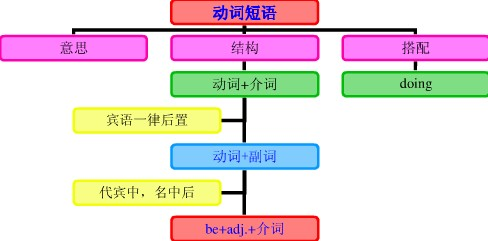
主谓一致的概念:
谓语的数必须和主语的人称和数保持一致,这就叫主谓一致。
主谓一致的基本原则:
1)语法一致原则,即在语法形式上取得一致。例如,主语是单数形式,谓语动词也采取单数形式;主语是复数形式,谓语动词也采取复数形式。
例如:The students are very young.
This picture looks beautiful.
2)意义一致原则,即从意义着眼处理一致关系。例如,主语形式虽是单数但意义是复数,谓语动词也采取复数形式;
而有些主语形式虽是复数但意义上看作单数,谓语动词也采取单数形式。
例如:The people in that country are fighting for independence.
The crowd deeply respect their leader.
Three years in a strange land seems a long time.
3)就近原则,即谓语动词的单数或复数形式取决于最靠近它的词语。
例如:Neither hen or I am going to see the film tonight because we are busy.
几对容易混淆词组的一致用法:
1、由“this/thatkind/typeof+名词”作主语,谓语动词用单数形式;而由"these/thosekind/typeof+复数名词”作主语,谓语动词用复数形式。
例如:This kind of apples is highly priced.
Those kind(s) of tests are good.
2、由“a number of,a totalo f,an average of+复数名词”作主语,谓语动词用复数形式;由“the number of,the total of,the average of+复数名词”作主语,谓语动词用单数形式。
例如:A number of students are waiting for the bus.
The number of the students in this university is increasing yearly.
3、one of,the(only) one of的一致用法
例如:This is one of the books that have been recommended.
This is the(only) one of the books that has been recommended.
主谓一致用法点拨:
1、并列结构作主语谓语用复数:
如:Reading and writing are very important.
注意:当主语由and连结时,如果它表示一个单一的概念,即指同一人或同一物时,谓语动词用单数,and此时连接的两个词前只有一个冠词。
如:The iron and steel industry is very important to our life.
典型例题:
The League secretary and monitor___asked to make a speech at the meeting.
A. is
B. was
C. are
D. were
答案:B.
注:先从时态上考虑。这是过去发生的事情应用过去时,先排除A、C本题易误选D,因为The League secretary and monitor 好象是两个人,但仔细辨别,monitor前没有the,在英语中,当一人兼数职时只在第一个职务前加定冠词。后面的职务用and相连。这样本题主语为一个人,所以应选B。
2、主谓一致中的靠近原则:
1)当there be句型的主语是一系列事物时,谓语应与最邻近的主语保持一致。
例如:There is a pen, a knife and several books on the desk.
There are twenty boy-students and twenty-three girl-students in the class.
2)当either…or…与neither…nor,连接两个主语时,谓语动词与最邻近的主语保持一致。
如果句子是由here, there引导,而主语又不止一个时,谓语通常也和最邻近的主语一致。
例如:Either you or she is to go.
Here is a pen, a few envelops and some paper for you.
3、谓语动词与前面的主语一致:
当主语后面跟有with, together with, like, except, but, no less than, as well as等词引起的短语时,谓语动词与前面的主语一致。
例如:The teacher together with some students is visiting the factory.
He as well as I wants to go boating.
4、谓语需用单数:
1)代词each和由every, some, no, any等构成的复合代词作主语,或主语中含有each,every,谓语需用单数。
例如:Each of us has a tape-recorder.
2)当主语是一本书或一条格言时,谓语动词常用单数。
例如:The Arabian Night is a book known to lovers of English.
3)表示金钱,时间,价格或度量衡的复合名词作主语时,通常把这些名词看作一个整体,谓语一般用单数。(用复数也可,意思不变。)
例如:Three weeks was allowed for making the necessary preparations.
Ten yuan is enough.
5、指代意义决定谓语的单复数:
1)在代词what, which, who, none, some, any, more, most, all等词的单复数由其指代的词的单复数决定。
例如:All is right. (一切顺利。)
All are present. (所有人都到齐了。)
2)集体名词作主语时,谓语的数要根据主语的意思来决定。
例如:family, audience, crew, crowd, class, company, committee等词后用复数形式时,意为这个集体中的各个成员,用单数时表示该个集体。
例如:His family isn't very large. 他家不是一个大家庭。
His family are music lovers. 他的家人都是音乐爱好者。
但集合名词people, police, cattle, poultry等在任何情况下都用复数形式。
例如:Are there any police around?
3)有些名词,如variety, number, population, proportion, majority等有时看作单数,有时看作复数。
A number of+名词复数+复数动词。 The number of+名词复数+单数动词。
例如:A number of books have lent out.
The majority of the students like English.
6、与后接名词或代词保持一致:
1)用half of, part of, most of, a portion of等词引起主语时,动词通常与of后面的名词,代词保持一致。
例如:Most of his money is spent on books.
Most of the students are taking an active part in sports.
2)在一些短语,如many a或more than one所修饰的词作主语时,谓语动词多用单数形式。
但由more than…of作主语时,动词应与其后的名词或代词保持一致。
例如:Many a person has read the novel. 许多人都读过这本书。
More than 60percent of the students are from the city. 百分之六十多的学生都来自这个城市
主谓一致知识体系:
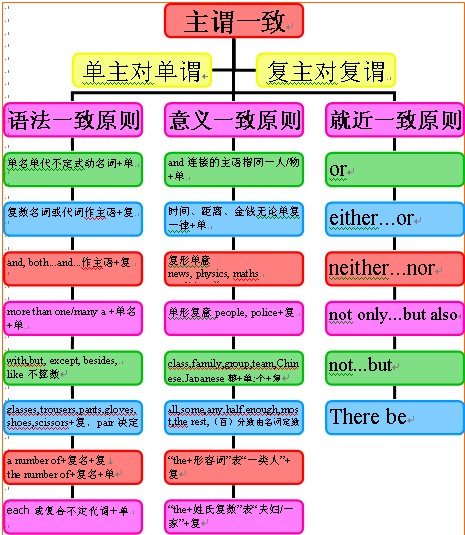
主谓一致用法拓展:
1)当everyone,everybody,noone,nobody,anyone,anybody,someone,somebody,everything,anything,something,nothing等用作主语时,其相应的代词一般用单数形式。
例如:If anybody calls, tell him that I'm out.
Something strange happened, didn't it?
2)人称代词与名词的呼应:人称代词I(me),he(him),she(her),it(it) 都是代替前面的单数名词,而they(them),we(us)则是代替复数名词的,you既可以代表单数,也可以代表复数。但表示泛指的时候,用he或one来表示。
例如:If a young person enters a classical music field only for money, he is in the wrong profession.
3)物主代词与名词的呼应:my,our,his,her,its,their要与代替的名词在数上一致。
例如:The welfare department,as well as the other social services,will have its budget cut.
4)反身代词与其所代成分间的呼应。
例如:Many primitive people believed that by eating ananimal they could get some of the good qualities of that animal for themselves.
5)指示代词与所代名词间的呼应:this和that指代单数名词或不可数名词,these和those指代复数名词(those还可以用作先行词,引导定语从句,表示“那些人”)。
例如:She invited all those who had been her former colleagues.
6)much和muchof后接不可数名词,而many和manyof后接可数名词的复数。
例如:There is not much coal left.
A great many of the houses were knocked down by the earthquake.
7)表示量的词后面有的接可数名词,有的接不可数名词。
接可数名词的有:a number of,a rangeof,a series of十复数名词;
接不可数名词的有:a great deal of,an amount of十不可数名词;
既可接可数又可接不可数名词的有:a lot of,a variety of。
例如:1.The government attached a great deal of importance to education.
2.Quiteanumberofwomenappliedforthisjob.
3.The college library has avariety of books.
4.An apple is avariety off ruit.
与“单句改错下面每句中都有一处错误。错误涉及一个单词的增加、...”考查相似的试题有:
- Vegetables _________ many kinds of vitamins and many other useful materials. We should eat them_________.A.contain ...
- The laboratory _____ they had devoted all their time and energy was destroyed in the earthquake.A. whereB. thatC. to ...
- Parents are ________ to be invited to this year’s New Year party.A.possibleB.probableC.likeD.likely
- My parents want me to take ______ maths lessons at the weekend, but I want to relax myself.A.extraB.averageC.freeD...
- —Tom is very stupid. He fails in every exam.—In my opinion, he is ____ than stupid. A. lazierB. no lazierC. more lazy...
- -- Why do you suggest we buy a new machine?--- Because the old one has been damaged ___________.A.beyond reachB.bey...
- _Stressful environments lead to unhealthy behaviors such as poor eating habits,which_______increase the risk of heart...
- — When will you leave for Paris for a visit?— next month.A.UntilB.AfterC.AtD.In
- People have planted a great many trees in order to __________ wind and sand in the desert.[ ]A. hold downB. hold upC....
- — What was she doing when you visited her?.— She was _____ herself in the mirror. A.admiringB.seeingC.enjoyingD.d...